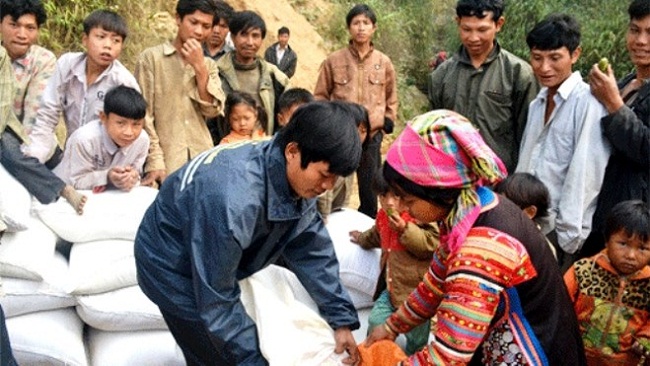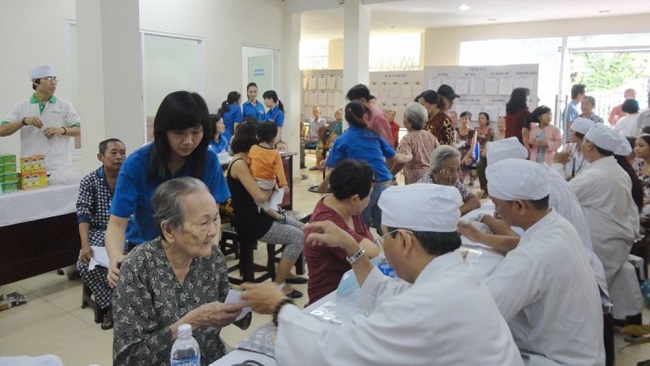Cutting red tape in APA approvals to speed up tax negotiations
The change in APA approval authority is expected to shorten processing time and enhance business proactiveness in international tax negotiations.




If inequality was not increasing, Vietnam’s poverty reduction record would be even better, according to the leading international non-governmental organization Oxfam.

Under the Oxfam's recently published commitment to reducing inequality (CRI) index to assess governments based upon three main pillars of social spendings, taxation and labor rights, Vietnam was ranked 99th out of 157 countries and 13th out of 23 countries in East Asia and the Pacific, placing Vietnam in the middle group of countries.
Vu Thi Quynh Hoa, Head of Campaign & Advocacy of Oxfam shared her oppinions with TheLEADER. She stressed that over the past years, Vietnam has a strong record of poverty reduction, but increasing inequality is threatening decades of progress.
The Oxfam's high profile expert involved in the index assessment emphasized that Vietnam may be ranked higher in coming years, depending on the government’s choices and policy actions.
What is your comment on such position for Vietnam's government in its commitment to reducing inequality? Is the ranking reflected in tune with the country’s attempt in poverty reduction in recent years?
Vu Thi Quynh Hoa: The index measures the policy actions taken by 157 governments in three areas (social spending, taxation, labour rights) that have been shown to be critical to reducing the gap between rich and poor.
The index reveals governments split between fighting and fueling inequality. For example, Nigeria, Singapore, and Argentina are among a group of governments that are fueling inequality; meanwhile governments such as South Korea, Indonesia, and Georgia are taking positive steps to reduce the gap between rich and poor.
However, all countries, even those at the top, could be doing much more.
Overall, Vietnam was ranked 99th out of 157 countries and 13th out of 23 countries in East Asia and the Pacific, placing Vietnam in the middle group of countries.
However, looking at the trends analysis in the CRI report, the Vietnamese government has choices to make about its future policies. Either we could belong to the advancing or lagging behind countries in the years to come. This depends very much on the commitments and the policy actions that our government will take to acknowledge and tackle inequality in Vietnam.
There are positive examples both globally and in the region that we can learn from. For example, in South Korea, President Moon vowed to tackle the growing gap between rich and poor and create a more ‘people-centered economy’.
In the last year, he has made good on his word, hiking the minimum wage by 16.4 per cent, increasing taxes on wealthy people and corporations, and boosting social spending, including a universal child support grant.
Indonesia is another positive case. The government has also increased the minimum wage and ramped up health spending, to help finance the move to a new system of universal health coverage.
And China spends more than twice as much of its budget on health, even higher than India, and almost four times as much on welfare spending, showing a much greater commitment to tackle the gap between the rich and the poor.
Vietnam’s ranking is a reflection on its achievements, challenges and future vision. Over the past years, Vietnam has a strong record of poverty reduction, but increasing inequality is threatening decades of progress.
Inequality exists in Vietnam in the forms of income, opportunity and people’s voices. Economic inequality is reinforced by inequality of voice and opportunity leaving millions of people without a chance for social mobility. If inequality was not increasing, Vietnam’s poverty reduction record would be even better. For instance, the World Bank’s 2018 Poverty Assessment report found that if there were no changes in inequality, poverty would reduce further by 1.1 percent.
Looking forwards, I keep an optimistic outlook about Vietnam. The government has made strong commitments to the UN’s 17 Sustainable Development Goals and developed a concrete action plan to back up its rhetoric. Inequality has gradually been acknowledged, questioned and the debates shifted by the public, business leaders and officials. There are effective policy actions on poverty reduction in place. Certainly, there are more actions that the Vietnamesegovernment can take to improve its CRI ranking in the coming time.
Why have Oxfam and its partner attributed three main integrated pillars to the ranking of CRI? What do they reflect about the country's attempt in respective sectors?

Vu Thi Quynh Hoa: The CRI Index measures government efforts in three policy areas or ‘pillars’, namely social spending, taxation and labour. These were selected because of widespread evidence that government actions in these three areas have in the past played a key part in reducing the gap between the rich and the poor.
The CRI Index was audited by the Joint Research Centre of the European Commission which concluded that it is robust statistically and is paving the way towards a monitoring framework that can help identify weaknesses and best practices in governments’ efforts to reduce the gap between the rich and the poor.
For example, a study of 13 developing countries that had reduced their overall inequality levels found that 69 per cent of this reduction was because of social spending on public services. Social spending can also play a key role in reducing the amount of unpaid care work that many women often do - a major cause of gender inequality - by redistributing child and elder care, healthcare and other domestic labour.
Progressive taxation has been clearly documented by the International Monetary Fund (IMF) to be a key redistributive tool for countries at all income levels. And there is also strong evidence that higher wages for ordinary workers and stronger labour rights, especially for women, are key to reducing inequality.
Evidence from the IMF and others shows that the recent global decline in trade union membership is linked to the rise in inequality, as workers lose bargaining power and more of the value of production goes to profits and the owners of capital. Women are disproportionately represented in the lowest-paid jobs throughout the world, with weak social protection and precarious conditions of employment.
The ranking of Vietnam shows that the Vietnamese government has taken some positive steps to reduce inequality. Among the three pillars, tax is the most positive commitment policy area of Vietnam that was ranked 46th.
That means the tax structure is progressive. Vietnam would have been ranked even higher if the government had not reduced corporate income taxes (CIT) from 22 per cent in 2015 to 20 per cent in 2017.
Vietnam’s CIT is currently low comparing to other countries in the region. And if Vietnam would have phased out redundant and harmful tax incentives for corporate. In addition, the government should also consider how the proposed increase in VAT from 10 per cent to 12 per cent would impact people. Clearly, harmful tax avoidance and other tax incentives cause a potential loss for resource mobilization to the state budget.
On social spending, it is encouraging that Vietnam is ranked one among the top ten countries that has increased the social spending, showing government actions towards specific policies and programmes designed for disadvantaged groups.
Vietnam scores less well on indicators related to transparency and labour rights, ranked 126th. There is a legal framework to protect workers, especially women. However, there is much work to do in improving this ranking, such as performance in practice in respecting labour and union rights according to ILO standards, improving legal provisions for equal pay, nondiscrimination, rape, sexual harassment and length of parental leave, and providing a living wage for workers to ensure they are not trapped in near-poverty.

What are interference associated with specific events and contributions that will be deployed and undertaken in Vietnam along with its government to improve its CRI ranking? How will work out with relevant authorities in enhancing and reinforcing their commitments of social spending (MOLISA), progressive taxation (MOF) and labor rights and minimum wages?
Vu Thi Quynh Hoa: Obviously, inequality traps people in poverty and is bad for all of us. It reduces economic growth and weakens a country’s achievements and outcomes. There will be no end to extreme poverty unless governments tackle inequality and reverse recent trends.
It is the right time and momentum that tackling inequality should be mainstreamed into working agenda of all related ministries, not only MPI which is the focal point for the Sustainable Development Goals (SDGs) implementation in Vietnam. Reducing inequality should be part of poverty reduction and monitoring agenda of MOLISA, National Assembly and the socio-economic development planning (SEDP) process.
Vietnam has made a commitment to reduce inequality and eradicate poverty through SDGs and specifically Goal 10 on reducing inequality. Goal 10 will be reviewed in 2019.
The Vietnamese government could dramatically improve its efforts on progressive spending, taxation and workers’ pay and social protection as part of the National Inequality Reduction Plan.
This would include: i) increases in taxation of the richest corporations and individuals, phasing out redundant and harmful tax incentives for corporate and an end to tax dodging and the harmful race to the bottom on taxation; ii) systematically tracking of public expenditures with the involvement of citizens on spending on public services and social protection; iii) better paid and protection of workers in policy and practices; and iv) monitoring progress of inequality reduction.
What recommendations will Oxfam make to the Vietnam's government or what message will it reflect through its CRI's ranking 2018?
Vu Thi Quynh Hoa: The CRI 2018 shows clearly that inequality is a policy choice. Clear and simple steps can be taken to tackle it. Actions taken by the most committed governments are an invitation and momentum for others to re-shape their aspirations and agendas. The index also shows us that combatting inequality isn’t about being the wealthiest country. It’s about having the political will to pass and put into practice the policies that will narrow the gap between the super-rich and the poor.
Change is possible, and it is happening. Vietnam may be ranked higher in coming years, depending on the government’s choices and actions.
In particular, the Vietnamese government can work with international organizations, civil society, think tanks, research institutes and academia to: i) monitor the implementation of policies that are known to tackle inequality, and assess their impacts, especially policies around taxation, socialization, wages and labour rights, public spending; ii) radically and rapidly improve data on inequality and related policies to accurately and regularly monitor progress in reducing inequality.
Official data on spending (health, education, social protection), tax, and labour policies should be collected regularly as part of the SDGs monitoring process, and gender-specific data are essential; and iii) create an enabling environment and facilitate interactive feedback mechanisms so that citizens and civil society are empowered to claim their rights.
In addition, the Vietnamese government should consider three other areas that will contribute to the sustainability of poverty and inequality reduction in the long run.
Firstly, economic inequality and gender: Gender inequality is exacerbating the growing gap between the rich and the poor, while growing inequality is in turn making the fight for gender equality harder. Oxfam strongly supports efforts to increase both gender-responsive budgeting and the collection of gender-disaggregated data, as the gender data gap can prevent countries from understanding the effects of inequality on women and girls, leading to the creation of policies that are gender-blind and ultimately further reinforcing gender inequality.
Secondly, economic inequality and youth: Oxfam’s research on social mobility in Vietnam found that mobility between generations has slowed in recent years. Gender inequality interacts with economic inequality to lower the social mobility of women and girls affecting future hope and creating inter-generation inequality.
Therefore, equally strong labour rights and equal opportunity are key to helping young people secure a fair employment and wage.
Finally, there are other policies that the government can take, for example, to support small and medium-sized enterprises (SMEs), rural development and financial inclusion– which can have an impact to reduce inequality.
Thank you very much!
The change in APA approval authority is expected to shorten processing time and enhance business proactiveness in international tax negotiations.
As hybrid cloud systems grow more complex, Vietnamese enterprises are struggling to detect cybersecurity threats moving laterally within their own networks.
The submission of the draft resolution on Vietnam’s international financial center to the National Assembly heralds a new developmental era for the country.
More than just running a 5-star resort, Kristian Petersen is redefining the art of hospitality with a humane and sustainable leadership philosophy.
For Tyna Huynh, co-founder of Drinkizz, organic is not just a food choice but a way of life that fosters a deep connection between people, nature and community.
Embracing respectful workplaces could very well be the key to unlocking a more prosperous future for Vietnam's garment industry.